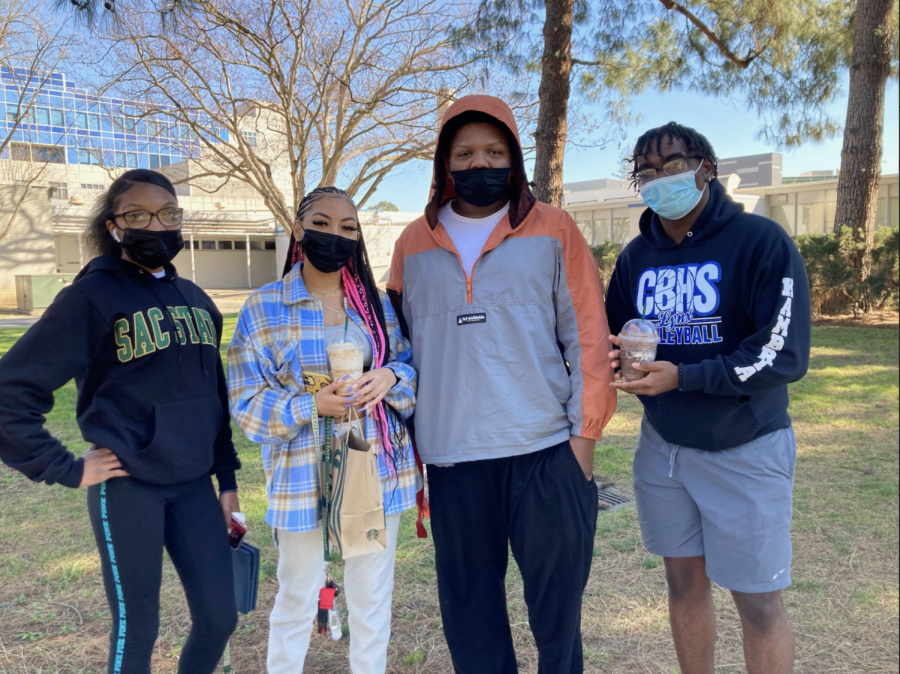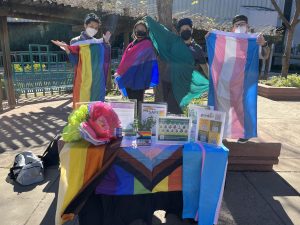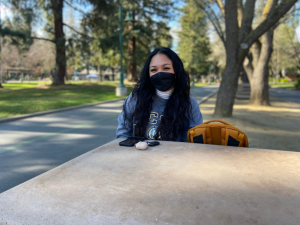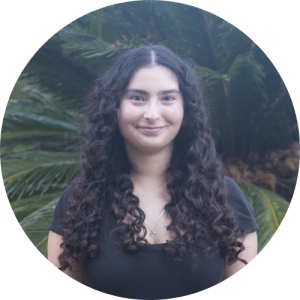Black students reflect on experiences with diversity at Sac State following anti-racism and inclusion convocation
Brysha Igie, criminal justice major; Renee Arriola, an English major; Mike Harp, a psychology major; and Donovan Lhle, a kinesiology major, pose together while on a walk on campus Saturday, Feb. 19. Sac State Black students have differing opinions about racism and diversity on campus. (Photo by Andrea Molinar)
March 4, 2022
On Feb. 14, Sacramento State held an anti-racism and inclusion convocation on Zoom to discuss the campus’ antiracism and inclusivity plan.
However, some Black students seemed to be unaware of the virtual event. Jakimah Carter, a criminal justice major, said she didn’t know the convocation was even happening.
“I didn’t even know that was going on,” Carter said. “None of my [professors] mentioned anything.”
Sac State students, alumni, faculty, staff, administration, and members of the Sacramento community had all been invited to attend via a SacSend email. President Robert S. Nelsen even provided students with the ability to attend the event without facing any penalty for missing classes.
According to an article posted on Sac State’s website, there were around 2,200 people who registered, which is only about 14 percent of the school’s population.
“It should have been better publicized,” Carter said. “Like maybe sending out emails or like when we’re logging onto our portals, something that [announces] events coming up.”
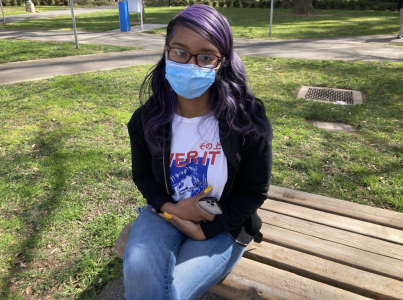
Carter said that she was unaware of what Sac State was doing in terms of the Anti-racism and inclusion plan and isn’t sure how much it will help.
The Anti-racism and Inclusive Campus Plan was a 324-page plan that intends to help by making Sac State a safe, tolerant, and open-minded campus according to Mia Settles-Tidwell, the university’s vice president for Inclusive Excellence.
Settles-Tidwell said that the plan will take five years to enact and that the first year will focus on the belief that racism and exclusivity already exist on campus.
Mike Harp, a psychology major, said he agrees that Sac State is not an inclusive campus by default and that racism does exist.
“Unfortunately, yes,” Harp said. “Just today we saw [that] someone wrote a very derogatory term on someone’s car.”
By the fifth year of the plan, Settles-Tidwell said the university hopes that the campus will be a very different space than what it is today. However, Renee Arriola, a first-year English major, said she isn’t convinced that things like what Harp witnessed won’t still be happening.
“[Sac State] can’t stop people from being racist,” Arriola said. “I think they should incorporate more [diversity-related] activities.”
Arriola said she doesn’t believe that five years is a fair time frame but that more time and effort will be necessary to make the campus a more inclusive and safe place.
According to her, anything that would bring students, faculty, and staff together to be able to better respect each other’s different backgrounds would be beneficial.
Part of the intention of the plan is to make some changes so that the campus faculty and staff will better represent the diversity of the student population according to Settles-Tidwell. However, students seem to be divided regarding their opinions on the matter.
“I do believe [they’re diverse], at least so far for my professors,” said Benita Iwuh, a health science major.
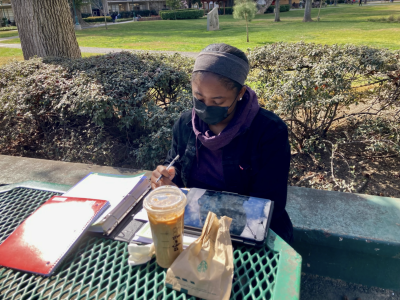
However, she adds that her experience at Sac State has been limited as she is a recent transfer and isn’t sure if its diversity is necessarily the case everywhere else on campus.
Brysha Igie, a first-year criminal justice major, said she agrees with the idea that the campus isn’t diverse enough and believes that Sac State is in need of a more diverse staff to reflect the student population.
“We even need a more diverse website,” Igie said. “Just because when you look up the school, you don’t see us.”
Donovan Lhle, a first-year kinesiology major, said he believes that there is plenty that Sac State can do to improve diversity and inclusivity on campus and remains hopeful.
“Despite looking at [our] skin,” he said. “I think that everyone can learn to understand each other.”






























































































































